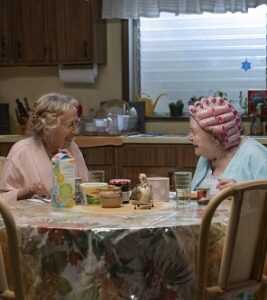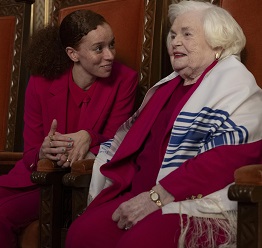Eleanor the Great
 Eleanor Morgenstein is a 94-year-old Florida resident who decides to move back to New York upon the death of her best friend Bessie. So, at this late stage in life Eleanor’s world completely changes. Her recently divorced daughter Lisa has a career, and Lisa’s son Max is active with high school activities. This arrangement leaves Eleanor alone in their Manhattan apartment most days to fend for herself.
Eleanor Morgenstein is a 94-year-old Florida resident who decides to move back to New York upon the death of her best friend Bessie. So, at this late stage in life Eleanor’s world completely changes. Her recently divorced daughter Lisa has a career, and Lisa’s son Max is active with high school activities. This arrangement leaves Eleanor alone in their Manhattan apartment most days to fend for herself.
Eleanor rejects Lisa’s suggestion to move into an assisted living facility, but she does take her up on joining the music class at the local JCC. At the JCC, Eleanor wanders into the wrong room and sits down with a group of Holocaust survivors. Asked to share her own experience, Eleanor opens up about her early life in Poland, her family’s capture by the Nazis, and then losing her parents and brother in a concentration camp.
Shocking twist
The only problem? The story isn’t hers. It’s the story of her deceased best friend Bessie. Eleanor grew up in Iowa and only moved to New York when she got married. So, why would she take on Bessie’s story as her own? Is she that desperate to fit in? Is she naturally given to deceiving others? This is the set-up for “Eleanor the Great,” the first film directed by actress Scarlett Johansson. It stars the great character actress June Squibb in her best role ever. Squibb is now 95 years old.
Surprisingly deep
“Eleanor the Great” isn’t some pity party for the aged. Nor is it a light comedy about a nanogenarian able to relate to the younger generation. No, this film is a surprisingly deep exploration of grief and loss. But it’s not a downer. Anything but! “Eleanor the Great” is one of the real surprises of the young Oscar season. I expected Paul Thomas Anderson’s “One Battle After Another” to be great; his films usually are. This one comes straight out of left field. Flying under the proverbial radar, Squibb takes the early lead for Best Acress by turning in a nuanced performance as a likeable woman dealing with the very real loss of her best friend – a loss no one else seems to want to discuss.
 The new friend
The new friend
Save for one person. Nina (British actress Erin Kellyman) is a New York University journalism student and daughter of a prominent local television journalist, played by Chiwetel Ejiofor (“12 Years a Slave”). Nina hears about Eleanor’s supposed Holocaust experience and decides to feature her in a school project. At first, Eleanor is opposed to the idea – knowing her “story” is false. But the two become fast friends when Eleanor prods Nina to open up about the recent loss of her mother – a subject her father doesn’t want to discuss.
Lets her actors act
That Eleanor and Nina help each other navigate the painful world of loss trivializes “Eleanor the Great.” It is a calmly powerful film, which instantly takes its place among the year’s best. Working from an original screenplay by Tory Kamen, Johansson’s direction reminds me of that of other actors who have taken their place behind the camera. The recent passing of Robert Redford reminds me that he used to do what the Hollywood community refers to as, “letting his actors act.” So does Johansson. Squibb, Kellyman, and Ejiofor each have “big scenes,” and Johansson lets them parade their talent without a lot of “interference” from tricky camerawork or special effects.
I expect strong special effects from the latest “Star Wars” picture. I expect a particularly mobile and active camera from Paul Thomas Anderson. After all, he’s the classic “director’s director,” cut from the same mold as Stanley Kubrick. To Anderson, his actors are elements at his disposal to tell his story and make his point. They carry equal weight with his use of sound and music, his editing, and his use of camera movement. To Johansson, her actors tell her story.
June Squibb
June Squibb began her career on Broadway. She wasn’t even in a movie until age 61. She first rose to prominence as Jack Nicholson’s wife in Alexander Payne’s 2002 comedy “About Schmidt.” But her role was relatively small, as she died early on. Payne used her again as Bruce Dern’s wife in 2013’s “Nebraska.” That film was a tour de force for Dern, but Squibb held her own and was awarded with a Best Supporting Actress nomination. Still, “Nebraska” was Dern’s film.
This time, Squibb is the lead. This is her film. This is her time to shine. And she nails the challenging role. Play it too sweetly, and the film would suffer from over-sentimentality. Play it too saucy – like her character in “Nebraska,” for instance – and the Eleanor character would be too unlikable to generate any sympathy. She threads the needle just right. And Kudos to Johansson for wringing the ideal tone from not only Squibb, but also from Kellyman, who more than holds her own against one of our greatest living actresses. Again, Kellyman could have played the young journalism student too forceful, or she could have played it too meek. She too hits just the right notes.
Not one bad scene
There isn’t a bad scene in “Eleanor the Great,” and in this day and age of increasingly long films, this one clocks in at just over 1-1/2 hours. Never draggy or overly emotional, this picture turns out to be a very pleasant surprise. With the completely different films “One Battle After Another” and “Eleanor the Great,” let the Oscar season begin!
Andy Ray‘s reviews also appear on https://townepost.com/tag/film-review/